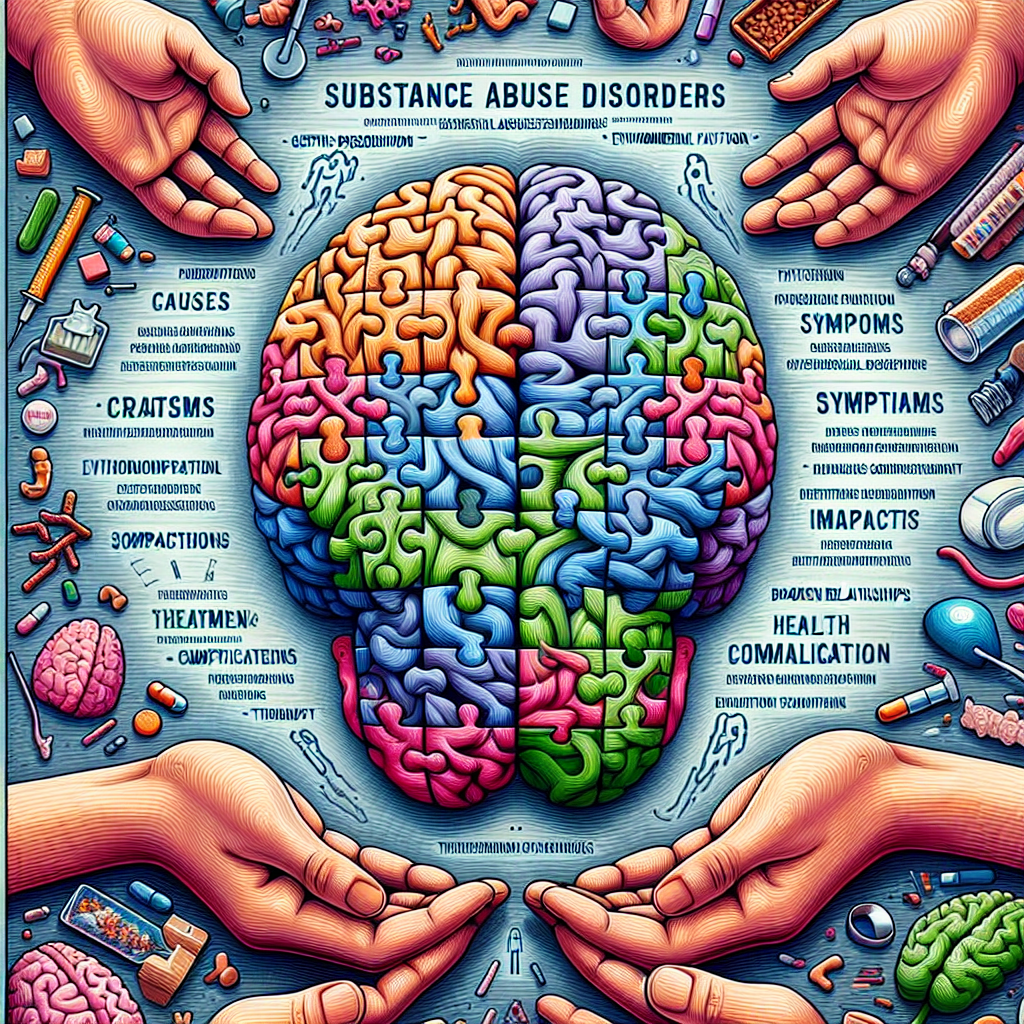In this article, you will gain a deeper understanding of substance abuse disorders, exploring the causes, risk factors, and treatment options available. Substance abuse disorders, which can encompass various substances such as alcohol, drugs, and prescription medications, can have a significant impact on individuals and their loved ones. By delving into the complexities of these disorders, we can begin to recognize the underlying factors that contribute to their prevalence and learn how to effectively address them for a healthier, brighter future.
Causes and Risk Factors of Substance Abuse
Genetics
Genetics can play a significant role in the development of substance abuse disorders. Research has shown that certain genetic factors can predispose individuals to have a higher risk of developing an addiction. This means that if you have a family history of substance abuse, you may be more susceptible to developing a substance abuse disorder yourself.
Family History
Growing up in an environment where substance abuse is prevalent can also increase your risk of developing a substance abuse disorder. This could be due to a combination of genetic and environmental factors. If you have family members who have struggled with addiction, it’s important to be aware of your increased vulnerability and take steps to mitigate the risk.
Trauma and Abuse
Experiencing trauma or abuse can be a significant contributing factor to the development of substance abuse disorders. People often turn to substances as a way to cope with difficult emotions or to numb emotional pain. If you have experienced trauma or abuse, it’s crucial to seek professional help and find healthier ways to manage your emotions.
Mental Health Disorders
There is a strong link between substance abuse disorders and mental health disorders. Many individuals with mental health disorders, such as depression or anxiety, turn to substances as a form of self-medication. Substance abuse can provide temporary relief from symptoms, but ultimately exacerbates the underlying mental health issues.
Peer Pressure and Social Influence
Peer pressure and social influence can also play a role in the development of substance abuse disorders. Surrounding yourself with individuals who engage in substance abuse can make it easier for you to fall into the same patterns. It’s essential to surround yourself with a supportive network of individuals who do not encourage or engage in substance abuse.
Signs and Symptoms of Substance Abuse Disorders
Physical Symptoms
There are several physical signs that may indicate a substance abuse disorder. These can include changes in appetite, weight loss or gain, insomnia or oversleeping, bloodshot eyes, and frequent illnesses. Additionally, you may experience tremors, coordination problems, or unexplained injuries.
Behavioral Symptoms
Changes in behavior are often present in individuals with substance abuse disorders. These can include sudden mood swings, irritability, agitation, or increased secrecy. You may also notice a decline in performance at work or school, neglecting responsibilities or hobbies, and engaging in risky behaviors.
Psychological Symptoms
Substance abuse disorders can have a profound impact on your psychological well-being. You may experience increased anxiety, depression, or paranoia. It is also common to have trouble concentrating, experiencing memory loss, or having difficulty making decisions. Feelings of guilt, shame, or worthlessness may also be present.

Types of Substances Abused
Alcohol
Alcohol is one of the most commonly abused substances and can lead to severe health, social, and legal consequences. Excessive alcohol consumption can result in liver damage, cardiovascular issues, and increased risk of accidents or injuries. If you find yourself unable to control your alcohol intake or experiencing negative consequences from drinking, it may be a sign of an alcohol use disorder.
Tobacco
Tobacco use, particularly cigarette smoking, poses significant health risks and can lead to addiction. Smoking increases the risk of lung cancer, respiratory diseases, and heart conditions. It can also have detrimental effects on your skin, teeth, and overall physical appearance. If you find it challenging to quit smoking or have developed a dependence on tobacco, it’s important to seek help and support.
Prescription Drugs
Prescription drugs, when used improperly or without a prescription, can lead to substance abuse disorders. Opioids, such as oxycodone or hydrocodone, are highly addictive and can easily lead to dependence. Stimulants, like Adderall or Ritalin, can be misused for their euphoric effects. It’s crucial to take prescription medications as directed and only under the supervision of a healthcare professional.
Illicit Drugs
Illicit drugs, such as cocaine, heroin, methamphetamine, and marijuana, carry significant risks and can lead to addiction. These substances can have severe health consequences and can result in legal issues and strained relationships. If you find yourself using illicit drugs or feeling unable to stop using despite negative consequences, it’s essential to seek professional help.
Effects of Substance Abuse Disorders
Health Consequences
Substance abuse disorders can have severe health consequences. Prolonged drug or alcohol abuse can lead to liver damage, cardiovascular problems, respiratory issues, and an increased risk of infectious diseases. Substance abuse can weaken your immune system, leading to frequent illnesses and decreased overall well-being.
Social and Interpersonal Effects
Substance abuse disorders can strain relationships with family, friends, and colleagues. Your behavior may become unpredictable or erratic, causing others to distance themselves from you. You may also experience financial difficulties due to the high cost of supporting your substance abuse habits. These social and interpersonal effects can significantly impact your overall quality of life.
Legal Consequences
Substance abuse can lead to legal consequences, including arrests, fines, and imprisonment. Engaging in risky behaviors while under the influence of substances, such as driving under the influence, can result in accidents and harm to yourself and others. Legal issues resulting from substance abuse can have long-lasting implications on various aspects of your life.

Diagnosing Substance Abuse Disorders
Diagnostic Criteria
Substance abuse disorders are diagnosed using criteria outlined in the Diagnostic and Statistical Manual of Mental Disorders (DSM-5). These criteria include impaired control over substance use, social impairment, risky use, and tolerance or withdrawal symptoms. A healthcare professional will evaluate your symptoms and behavior to determine whether you meet the criteria for a substance abuse disorder.
Screening and Assessment Tools
Various screening and assessment tools can be utilized to help diagnose substance abuse disorders. These tools assess the severity of your substance abuse, identify specific substances being abused, and evaluate any co-occurring mental health disorders. They provide valuable information that informs your treatment plan and helps healthcare professionals tailor their approach to your specific needs.
Treatment Options for Substance Abuse Disorders
Detoxification
Detoxification is often the first step in treating substance abuse disorders. It involves the process of removing the substances from your body safely under medical supervision. Detoxification helps manage withdrawal symptoms and ensures a safe transition into further treatment.
Inpatient Rehabilitation
Inpatient rehabilitation programs provide intensive treatment in a structured residential setting. These programs offer a range of therapeutic interventions and support services that address the physical, psychological, and social aspects of substance abuse disorders. Inpatient rehabilitation programs typically last for a few weeks to a few months.
Outpatient Programs
Outpatient programs are a less intensive treatment option that allows you to continue living at home while attending regular treatment sessions. These programs often include individual counseling, group therapy, and educational sessions. Outpatient programs are suitable for those with less severe substance abuse disorders or those transitioning from inpatient treatment.
Medication-Assisted Treatment
Medication-assisted treatment (MAT) involves the use of medications, in combination with counseling and behavioral therapies, to treat substance abuse disorders. Medications such as methadone, buprenorphine, or naltrexone can help reduce cravings and manage withdrawal symptoms. MAT is particularly effective for opioid and alcohol dependence.
Psychotherapy
Psychotherapy, also known as talk therapy, is a fundamental component of substance abuse treatment. It helps you explore the underlying causes of your substance abuse disorder, develop healthier coping mechanisms, and address any co-occurring mental health disorders. Various therapeutic approaches, such as cognitive-behavioral therapy (CBT) or motivational interviewing, can be utilized.
Support Groups
Support groups, such as Alcoholics Anonymous (AA) or Narcotics Anonymous (NA), provide a supportive community of individuals who have experienced similar struggles with substance abuse. These groups offer a safe space to share experiences, provide emotional support, and learn from others who are on a similar recovery journey.

Supporting Recovery and Relapse Prevention
Aftercare Programs
Aftercare programs are crucial in supporting long-term recovery. These programs provide ongoing support and resources after completing a formal treatment program. Aftercare may include individual counseling, group therapy, 12-step meetings, and relapse prevention strategies. Engaging in aftercare can help you maintain sobriety and minimize the risk of relapse.
Relapse Prevention Strategies
Relapse prevention strategies are essential for staying on track during your recovery journey. These strategies involve identifying and avoiding triggers, developing healthy coping mechanisms, and creating a strong support system. By incorporating specific techniques and strategies into your daily life, you can minimize the risk of relapse and maintain your sobriety.
Family and Social Support
Having the support of family and friends plays a vital role in your recovery. Open communication, understanding, and empathy from loved ones can help create a supportive environment that fosters your commitment to sobriety. Involving your family and loved ones in your treatment and aftercare can strengthen your support system and increase your chances of successful recovery.
Co-occurring Disorders and Dual Diagnosis
Understanding Co-occurring Disorders
Co-occurring disorders refer to the presence of both a substance abuse disorder and a mental health disorder. These conditions often coexist and can complicate the treatment process. Mental health disorders commonly associated with substance abuse disorders include depression, anxiety, bipolar disorder, and post-traumatic stress disorder (PTSD). It is crucial to address both aspects of a dual diagnosis to achieve successful recovery.
Integrated Treatment Approach
An integrated treatment approach is essential when treating co-occurring disorders. Integrated treatment involves addressing both the substance abuse disorder and the mental health disorder simultaneously, rather than treating them as separate conditions. This approach ensures that both conditions are treated effectively and that the chosen treatment strategies complement one another.
Collaborative Care
Collaborative care is a model that involves close coordination between healthcare professionals, mental health providers, and substance abuse treatment providers. This approach ensures that all aspects of a dual diagnosis are addressed comprehensively. By working together, providers can develop a unified treatment plan that meets both the substance abuse and mental health needs of the individual.

Prevention of Substance Abuse Disorders
Early Education and Awareness Programs
Early education and awareness programs play a crucial role in preventing substance abuse disorders. These programs aim to educate individuals about the risks and consequences of substance abuse, as well as provide information on healthy coping strategies. By equipping individuals with accurate information at a young age, prevention efforts can reduce the likelihood of substance abuse later in life.
Promotion of Healthy Coping Strategies
Promoting healthy coping strategies is an essential component of preventing substance abuse disorders. Teaching individuals how to effectively manage stress, emotions, and difficult situations can help reduce the reliance on substances as a coping mechanism. Encouraging the development of healthy outlets, such as exercise, mindfulness, or positive social interactions, can significantly impact substance abuse prevention.
Regulation and Control Measures
Regulation and control measures, such as strict laws and regulations around the sales and distribution of substances, can be effective in preventing substance abuse. These measures can include age restrictions, limits on sales, and monitoring prescription drug use. By implementing and enforcing these measures, communities can minimize access to substances and reduce the likelihood of abuse.
Stigma and Misconceptions Surrounding Substance Abuse Disorders
Addressing Stigma
Stigma surrounding substance abuse disorders can create barriers to seeking help and support. It is essential to address and challenge these stigmas to create an environment that promotes understanding and compassion. Educating the public about the nature of substance abuse disorders and sharing stories of recovery can help break down stigma and encourage individuals to seek help without fear of judgment.
Educating the Public
Public education plays a crucial role in reducing misconceptions and increasing awareness about substance abuse disorders. It is important to provide accurate information about the causes, risk factors, signs, and effects of substance abuse. By raising public awareness, promoting empathy, and encouraging open dialogue, we can create a society that supports prevention, treatment, and recovery for individuals with substance abuse disorders.
In conclusion, understanding substance abuse disorders, their causes, risk factors, and treatment options is crucial in addressing and combating this pervasive issue. By raising awareness, promoting prevention efforts, and providing comprehensive treatment and support, we can create a society that supports individuals struggling with substance abuse disorders on their recovery journey.


